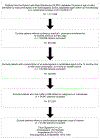Risk of Gastrointestinal Bleeding Increases With Combinations of Antithrombotic Agents and Patient Age
- PMID: 31108228
- PMCID: PMC7386161
- DOI: 10.1016/j.cgh.2019.05.017
Risk of Gastrointestinal Bleeding Increases With Combinations of Antithrombotic Agents and Patient Age
Abstract
Background & aims: The safety of different antithrombotic strategies for patients with 1 or more indication for antithrombotic drugs has not been determined. We investigated the risk and time frame for gastrointestinal bleeding (GIB) in patients prescribed different antithrombotic regimens. We proposed that risk would increase over time and with combination regimens, especially among elderly patients.
Methods: We performed a retrospective analysis of nationwide claims data from privately insured and Medicare Advantage enrollees who received anticoagulant and/or antiplatelet agents from October 1, 2010, through May 31, 2017. Patients were stratified by their prescriptions (anticoagulant alone, antiplatelet alone, or a combination) and by their primary diagnosis (atrial fibrillation, ischemic heart disease, or venous thromboembolism). The 1-year GIB risk was estimated using parametric time-to-event survival models and expressed as annualized risk and number needed to harm (NNH).
Results: Our final analysis included 311,211 patients (mean ages, 67 years for monotherapy and 69.8 years for combination antithrombotic therapy). There was no significant difference in the proportion of patients with bleeding after anticoagulant or antiplatelet monotherapy (∼3.5%/year). Combination antithrombotic therapy increased GIB risk compared with anticoagulant (NNH, 29) or antiplatelet (NNH, 31) monotherapy, regardless of the patients' diagnosis or time point analyzed. Advancing age was associated with increasing 1-year probability of GIB. Patients prescribed combination therapy were at the greatest risk for GIB, especially after the age of 75 years (GIB occurred in 10%-17.5% of patients/y).
Conclusions: In an analysis of nationwide insurance and Medicare claims data, we found GIB to occur in a higher proportion of patients prescribed combinations of anticoagulant and antiplatelet agents compared with monotherapy. Among all drug exposure categories and cardiovascular conditions, the risk of GIB increased with age, especially among patients older than 75 years.
Keywords: Anticoagulant; Antiplatelet; Atrial Fibrillation; Ischemic Heart Disease; Venous Thromboembolism.
Copyright © 2020 AGA Institute. Published by Elsevier Inc. All rights reserved.
Conflict of interest statement
Conflicts of interest
The authors disclose no conflicts.
Figures




References
-
- Abraham NS, Noseworthy PA, Yao X, et al. Gastrointestinal safety of direct oral anticoagulants: a large population-based study. Gastroenterology 2017;152:1014–1022.e1. - PubMed
-
- Abraham NS. New clinical paradigms for treating and preventing antiplatelet gastrointestinal bleeding. Curr Opin Gastroenterol 2017;33:467–472. - PubMed
Publication types
MeSH terms
Substances
Grants and funding
LinkOut - more resources
Full Text Sources
Medical

